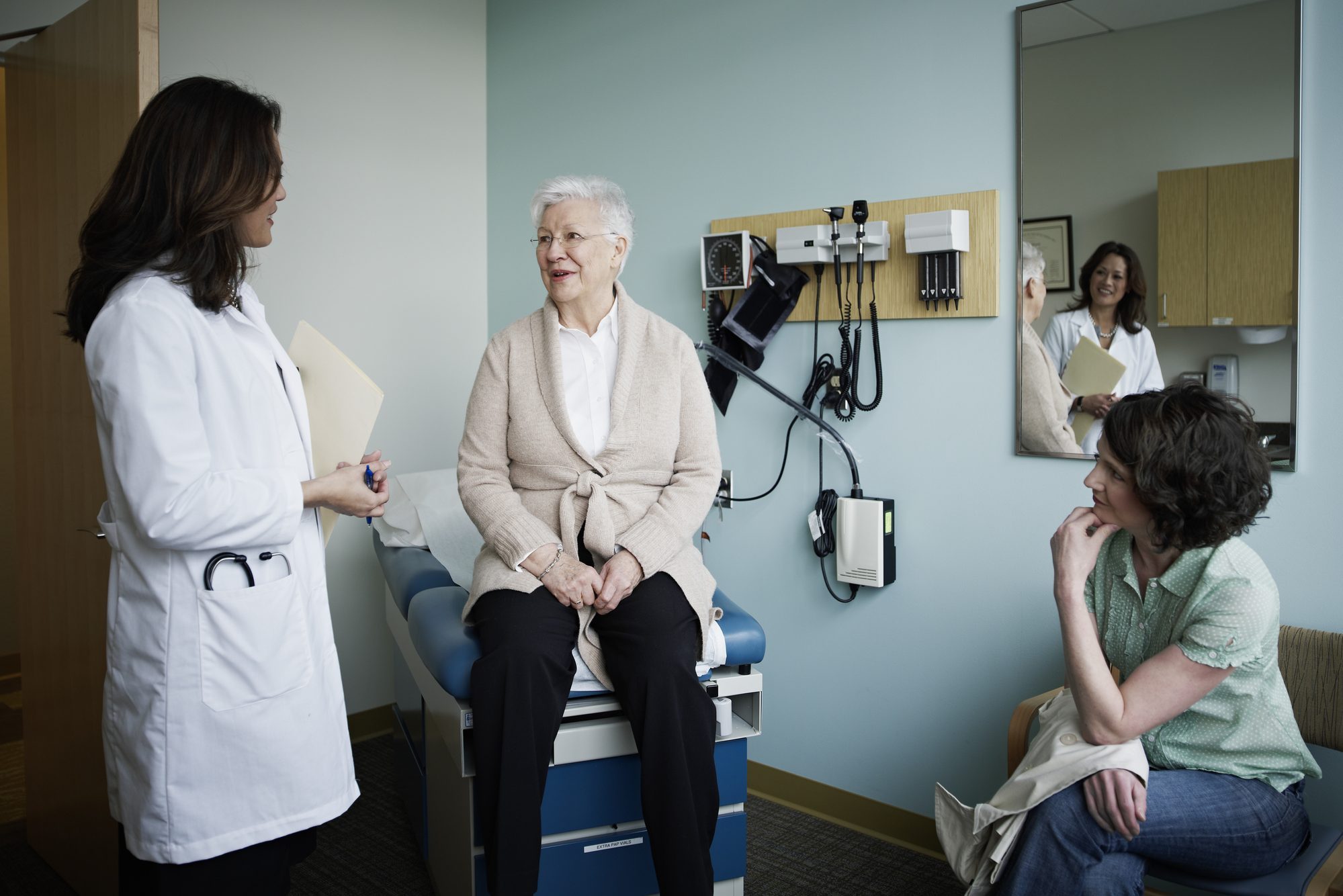What to Know About Lynch Syndrome
Updated: Oct. 10, 2022
This genetic condition raises your risk for a variety of cancers, including colorectal cancer. Here are the risk factors for the disease, plus how it's diagnosed and managed.
Lynch syndrome is underdiagnosed
Many things affect whether you develop cancer—and in some cases, the risk can be in your genes.
One in 279 people have Lynch syndrome, an inherited disorder that increases the risk of certain cancers, including colorectal, endometrial, ovarian, stomach, liver, and small intestinal cancers.
“Lynch syndrome is largely underdiagnosed,” says Sarah Burke, a certified genetic counselor with Moffitt Cancer Center in Tampa Bay, Florida. “Recent analysis shows that a large proportion of people are unaware of it, and an estimated that 95 percent of people in the United States with Lynch syndrome do not know they have it.”
That’s a problem. After all, if you don’t know you have it, you can’t proactively manage your risk for the associated cancers.
Here’s what Lynch syndrome is, how it’s diagnosed and how to prevent and manage related diseases.
What is Lynch syndrome?
Lynch syndrome is the most common cause of hereditary colon cancer, says Aparajita Singh, MD, gastroenterologist at UCSF Health in San Francisco who treats patients with this genetic disorder. About 3 percent of colorectal cancer cases are due to Lynch syndrome, according to the Centers for Disease Control and Prevention (CDC).
Lynch syndrome is also called hereditary nonpolyposis colorectal cancer, or HNPCC. The “hereditary” part of the name is key—Lynch syndrome is a result of a gene mutation. The genes involved include:
- MLHL
- MSH2
- MSH6
- PMS2
- EPCAM
“These genes normally protect us from getting certain cancers, but some mutations in these genes prevent them from doing their protective action properly,” says Dr. Singh.
Specifically, gene mutations in Lynch syndrome affect the ability to make some repairs in cells, explains Rebecca Stone, MD, associate professor and division director for gynecologic oncology at Johns Hopkins Hospital in Baltimore.
As normal cells divide, there can be errors as they copy DNA. Typically, these errors would be fixed. But when someone has Lynch syndrome, these mistakes are not able to be repaired. As abnormal cells continue to divide, they can grow into cancer.
People with Lynch syndrome may have polyps in their colon—benign growths that can turn cancerous and appear often in people with non-hereditary colorectal cancer—but they generally have only a few. Sometimes polyps may not be present.
Other risk factors for colorectal cancer
The inherited disorder familial adenomatous polyposis (FAP) is another risk factor for colorectal cancer. This syndrome typically starts with the development of many noncancerous polyps in the colon as early as the teen years. Polyps may number less than a hundred or into the thousands, getting larger and more dangerous with age. Eventually, some become cancerous.
Other risk factors for colorectal cancer include:
- Age
- Inflammatory bowel diseases such as Crohn’s disease or ulcerative colitis
- A family or personal history of colorectal cancer or polyps in the colon or rectum
- Being overweight or obese
- Low-fiber, high-fat diet
- Alcohol and/or tobacco use
- Lack of regular exercise
Increased cancer risk
Lynch syndrome increases your risk for a number of cancers. These cancers are more likely to be diagnosed under age 50. Your risk for each cancer also depends on your specific gene mutation.
Colorectal cancer
Lynch syndrome most commonly worsens the risk of colorectal cancer. “That risk can be as high as 50 percent, which is like flipping a coin,” says Burke. Normally, the overall risk for men and women is about 4 percent.
Endometrial and ovarian cancers
Cancers of the inner lining of the uterus (endometrial) and ovaries are two of the most common associated in women with Lynch syndrome, says Burke.
(Learn the symptoms of ovarian cancer that are easy to miss.)
Other cancers
People with Lynch syndrome may also be at risk for the following cancers:
- Stomach
- Small intestine
- Liver
- Gallbladder ducts
- Upper urinary tract
- Kidneys
- Brain
- Skin
- Prostate
Diagnosing Lynch syndrome
It’s important to know your family history of cancer—and tell your doctor. (So start chatting about it around the dinner table!)
Your doctor may recommend genetic testing to determine if you have Lynch syndrome, says Dr. Singh, if:
- You are diagnosed with colon or endometrial cancer before age 50.
- You have a first-degree relative (children, siblings, parents) diagnosed with colon or endometrial cancer before age 50.
- You have multiple cancers, or multiple members of your family have Lynch syndrome-associated cancer.
“With advancing technology, genetic testing has become very affordable and often covered by insurance companies,” Dr. Singh adds. Outside of insurance coverage, this test may run around $250.

Managing your cancer risk
Living with Lynch syndrome means you need to be vigilant. You’ll want to lower as many cancer risk factors as you’re able—like, for instance, avoiding smoking or quitting if you currently smoke. Cancer screening is key, as is paying close attention to your body. If symptoms of any cancers arise, you’ll want to talk to your doctor right away.
Don’t forget that it’s not uncommon to have more than one type of cancer with Lynch syndrome. If you are diagnosed with colon cancer at a young age, you may still develop another cancer.
“Make sure you’re getting the appropriate genetic counseling and testing done,” says Dr. Stone. Rather than laser-focusing on your current diagnosis, ask your doctor if you could have another cancer, too. A comprehensive evaluation is so important.
For colon cancer
Colon cancers in Lynch syndrome tend to be right-sided (meaning located on the right side of the colon).
“It’s not good enough to have a sigmoidoscopy,” says says Dr. Stone, referring to a test that scopes the rectum and lower part of the colon. “You need to go all around.”
The best screening test for that is a colonoscopy, which uses a long, flexible scope to look at the entire colon and rectum. Though current recommendations are for screenings beginning at ages 45 to 50, Dr. Stone suggests people with Lynch syndrome get tested as early as age 20. They’ll need to get screened every one to two years.
(These are the reasons why you might need early screening for colorectal cancer.)
For endometrial cancer
“Endometrial cancer is the second most-associated cancer in Lynch syndrome,” says Dr. Stone.
Certain tests, including an endometrial biopsy or ultrasound, have not shown a proven benefit. Without screening, how can you catch cancer before it gets out of hand? Because endometrial cancer has a clear symptom—abnormal menstrual bleeding—the most important thing you can do is see your ob-gyn if you experience this warning sign, Dr. Stone says.
(Learn the other signs you’re at risk for endometrial cancer.)
For ovarian cancer
The fortunate news is that when it comes to ovarian cancer “80 percent of patients present with early-stage cancer,” says Dr. Stone. Cancer is easier to treat (and recover from) when caught at an early stage.
Certain tests, like an ultrasound or blood test, screen for cancer markers, though research is not clear on their benefit. Talk to your doctor to see if screening is recommended for you.
For gastric and small bowel cancers
There isn’t a recommendation that everyone be screened for these cancers routinely, says the National Comprehensive Cancer Network (NCCN). Certain high-risk individuals may benefit from getting an esophagogastroduodenoscopy (EGD)—a procedure in which a doctor examines the inside of the stomach, esophagus, and duodenum, the first part of the small intestine—starting at age 40. These people would get screened every three to five years.
For renal pelvic, ureteral, and bladder cancers
The ureter is a long tube that connects the kidneys and bladder. At the top of the ureter is the renal pelvis, which collects urine from the kidneys. The urine passes it into the ureter and then into the bladder. The NCCN says that there is no evidence that screening is helpful in preventing these cancers. However, if you have a family history of these cancers, your doctor may advise getting a urinalysis (a test of the urine) annually, starting between ages 30 to 35.
For brain cancer
The NCCN suggests considering receiving an annual physical and neurological exam starting at age 25 to 30.
For other cancers
If you have Lynch syndrome, you may be at an increased risk for other cancers. Speak with your doctor about surveillance of these, which will depend on your individual risk factors, such as the specific gene variants you have and your personal or family history of cancer.
Preventive steps
There are numerous ways to reduce your risk of developing colorectal cancer when you have Lynch syndrome.
Healthy lifestyle
It’s important for everyone to practice healthy habits, but because of their increased risk of a variety of cancers, people with Lynch syndrome have an extra reason to focus on leading a healthy lifestyle, says Burke.
Those habits include avoiding smoking and excessive alcohol, maintaining a healthy body weight, and exercising. “Living an extra-healthy lifestyle could be extra protective in these patients,” she says.
Daily aspirin
Taking aspirin daily may help decrease your risk of developing colorectal cancer. A study published in The Lancet in 2020, had one group of patients with Lynch syndrome take aspirin and another group take a placebo.
After a decade, 9 percent of the aspirin group developed colorectal cancer, compared with 13 percent of the placebo group, with researchers suggesting that the drug may help prevent cancer. Aspirin is an anti-inflammatory, which may be behind its cancer-protective properties.
Daily aspirin use can lead to stomach ulcers and gastrointestinal bleeding, though it has been linked to a lower risk for stomach cancer. Before starting aspirin therapy, discuss the risks and benefits with your doctor.
Contraceptives
Oral contraceptives have been shown to decrease the risk for certain cancers, including ovarian and endometrial cancers by 28 and 32 percent, respectively. It’s important to know that this research, published in 2021 in Cancer Research, was done on a general female population, so the outcome may be different for women with Lynch syndrome.
Overall, hormonal contraception is a strategy used to decrease the risk of endometrial cancer in patients with Lynch syndrome, says Dr. Stone. But its effect on the risk of ovarian cancer in women with Lynch syndrome is not clear.
When it comes to contraceptives, options include the combination pill (these contain estrogen and progestin), the progesterone-only pill, and the progesterone IUD, says Dr. Stone.
Gynecologic surgery
Some women with Lynch syndrome may opt to remove organs that are at risk for cancer by having a total hysterectomy. The procedure removes the uterus and cervix. Often the ovaries are removed as well.
Whether or not to undergo such surgeries is something you’ll want to discuss with your doctor. Together you’ll consider family history, other health conditions, your specific gene mutations, and your desire to have children, says Dr. Stone.
Speaking with a genetic counselor or gynecologic oncologist can help you wade through the risks, benefits, and options when taking those factors into account.
This is in line with what Burke tells patients. “These gynecological cancers most commonly don’t occur during childbearing years, so we feel comfortable recommending waiting to have surgery until you are done having as big of a family as you want,” she says. “There is no reason that you should not be able to have children when you have Lynch syndrome.”
Outlook
Receiving a diagnosis of Lynch syndrome can be scary and difficult to adjust to. But there is reason to remain optimistic.
“There are numerous research studies going on that are increasing our understanding of Lynch syndrome,” Dr. Singh says. This includes immunotherapy (a treatment that helps the immune system fight cancer), clinical trials to study drugs to prevent cancer, and even a potential vaccine for cancer prevention in people with this condition.



